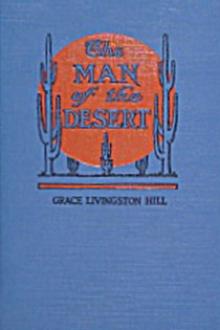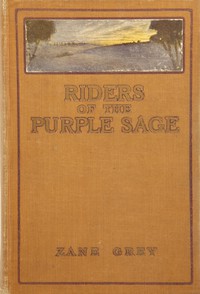The Desert of Wheat, Zane Grey [good non fiction books to read .TXT] 📗

- Author: Zane Grey
Book online «The Desert of Wheat, Zane Grey [good non fiction books to read .TXT] 📗». Author Zane Grey
At that instant, like bitter fate, shot up a rocket, or a star-flare of calcium light, bursting to expose all underneath in pitiless radiance. With a gasp that was a sob, Dorn shrank flat against the wall, staring into the fading circle, feeling a creep of paralysis. He must be seen. He expected the sharp, biting series of a machine-gun or the bursting of a bomb. But nothing happened, except that the flare died away. It had come from behind his own lines. Control of his muscles had almost returned when a heavy boom came from the German side. Miles away, perhaps, but close! That boom meant a great shell speeding on its hideous mission. It would pass over him. He listened. The wind came from that side. It was cold; it smelled of burned powder; it carried sounds he was beginning to appreciate—shots, rumbles, spats, and thuds, whistles of varying degree, all isolated sounds. Then he caught a strange, low moaning. It rose. It was coming fast. It became an o-o-o-O-O-O! Nearer and nearer! It took on a singing whistle. It was passing—no—falling!… A mighty blow was delivered to the earth—a jar—a splitting shock to windy darkness; a wave of heavy air was flung afar—and then came the soft, heavy thumping of falling earth.
That shell had exploded close to the place where Dorn stood. It terrified him. It reduced him to a palpitating, stricken wretch, utterly unable to cope with the terror. It was not what he had expected. What were words, anyhow? By words alone he had understood this shell thing. Death was only a word, too. But to be blown to atoms! It came every moment to some poor devil; it might come to him. But that was not fighting. Somewhere off in the blackness a huge iron monster belched this hell out upon defenseless men. Revolting and inconceivable truth!
It was Dorn's ordeal that his mentality robbed this hour of novelty and of adventure, that while his natural, physical fear incited panic and nausea and a horrible, convulsive internal retching, his highly organized, exquisitely sensitive mind, more like a woman's in its capacity for emotion, must suffer through imagining the infinite agonies that he might really escape. Every shell then must blow him to bits; every agony of every soldier must be his.
But he knew what his duty was, and as soon as he could move he began to edge along the short beat. Once at the end he drew a deep and shuddering breath, and, fighting all his involuntary instincts, he peered over the top. An invisible thing whipped close over his head. It did not whistle; it cut. Out in front of him was only thick, pale gloom, with spectral forms, leading away to the horizon, where flares, like sheet-lightning of a summer night's storm, ran along showing smoke and bold, ragged outlines. Then he went to the other end to peer over there. His eyes were keen, and through long years of habit at home, going about at night without light, he could see distinctly where ordinary sight would meet only a blank wall. The flat ground immediately before him was bare of living or moving objects. That was his duty as sentinel here—to make sure of no surprise patrol from the enemy lines. It helped Dorn to realize that he could accomplish this duty even though he was in a torment.
That space before him was empty, but it was charged with current. Wind, shadow, gloom, smoke, electricity, death, spirit—whatever that current was, Dorn felt it. He was more afraid of that than the occasional bullets which zipped across. Sometimes shots from his own squad rang out up and down the line. Off somewhat to the north a machine-gun on the Allies' side spoke now and then spitefully. Way back a big gun boomed. Dorn listened to the whine of shells from his own side with a far different sense than that with which he heard shells whine from the enemy. How natural and yet how unreasonable! Shells from the other side came over to destroy him; shells from his side went back to save him. But both were shot to kill! Was he, the unknown and shrinking novice of a soldier, any better than an unknown and shrinking soldier far across there in the darkness? What was equality? But these were Germans! That thing so often said—so beaten into his brain—did not convince out here in the face of death.
Four o'clock! With the gray light came a gradually increasing number of shells. Most of them struck far back. A few, to right and left, dropped near the front line. The dawn broke—such a dawn as he never dreamed of—smoky and raw, with thunder spreading to a circle all around the horizon.
He was relieved. On his way in he passed Purcell at the nearest post. The elegant New-Yorker bore himself with outward calm. But in the gray dawn he looked haggard and drawn. Older! That flashed through Dorn's mind. A single night had contained years, more than years. Others of the squad had subtly changed. Dixon gave him a penetrating look, as if he wore a mask, under which was a face of betrayal, of contrast to that soldier bearing, of youth that was gone forever.
CHAPTER XXVIIIThe squad of men to which Dorn belonged had to be on the lookout continually for an attack that was inevitable. The Germans were feeling out the line, probably to verify spy news of the United States troops taking over a sector. They had not, however, made sure of this fact.
The gas-shells came over regularly, making life for the men a kind of suffocation most of the time. And the great shells that blew enormous holes in front and in back of their position never allowed a relaxation from strain. Drawn and haggard grew the faces that had been so clean-cut and brown and fresh.
One evening at mess, when the sector appeared quiet enough to permit of rest, Rogers was talking to some comrades before the door of the dugout.
"It sure got my goat, that little promenade of ours last night over into No Man's Land," he said. "We had orders to slip out and halt a German patrol that was supposed to be stealing over to our line. We crawled on our bellies, looking and listening every minute. If that isn't the limit! My heart was in my mouth. I couldn't breathe. And for the first moments, if I'd run into a Hun, I'd had no more strength than a rabbit.





Comments (0)